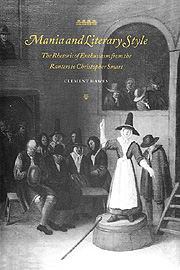Introduction: Mania as rhetoric
Published online by Cambridge University Press: 16 September 2009
Summary
Christopher, help me love this loose thing.
I think of you now, kneeling in London muck,
Praying for grace to descend.
Theodore Roethke, “The Dark Angel,” from Straw for the Fire: from the Notebooks of…This book concerns three moments of what I shall call a “manic” rhetoric. It explores the evolution of that rhetoric as represented in texts by Ranter Abiezer Coppe during the Interregnum, Jonathan Swift in the late seventeenth century, and Christopher Smart in the mid-eighteenth century. Above all, it concerns the manic as a specifically rhetorical phenomenon. It attempts a break from the inherited language for discussing a certain kind of centrally eccentric text – not so much a clean break as a sort of knight's move, a strategic reorientation of the older terms. I hope to rethink the “manic,” a term for individual pathology, from a transindividual and historical perspective. A certain kind of textual mania, as I shall demonstrate, can only be fully understood in connection with the prophetic and oracular religious rhetoric surrounding the English Revolution.
I contend, indeed, that the English Civil War must be seen as the well-spring of the manic rhetorical style in British letters. This is not to say that one cannot find prior texts with manic tendencies, but, rather, that later cultural memory has designated manic enthusiasm as the very sign of that ill-digested revolutionary trauma.
- Type
- Chapter
- Information
- Mania and Literary StyleThe Rhetoric of Enthusiasm from the Ranters to Christopher Smart, pp. 1 - 22Publisher: Cambridge University PressPrint publication year: 1996



